Top 7 CRM Software for Real Estate Businesses in 2026
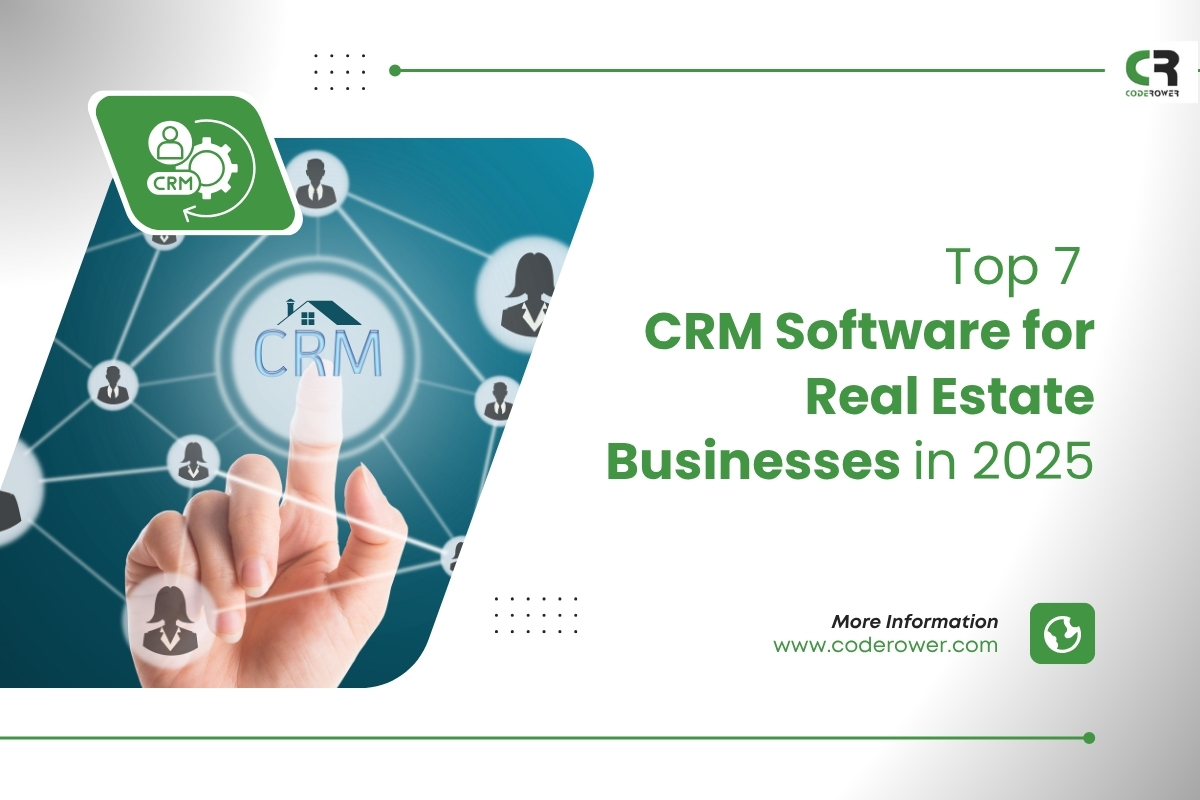
Still juggling spreadsheets, sticky notes, and phone reminders to manage your real estate leads?
In 2026, that’s like using a flip phone in a smartphone world.
The real estate industry is evolving fast — and so are client expectations. Buyers and sellers now expect instant responses, personalized service, and a smooth property journey from start to finish. To meet these demands, real estate professionals need more than just hard work; they need smart tools that automate, organize, and optimize every step of the sales process.
That’s where real estate customer relationship management (CRM) software becomes essential. A CRM helps you centralize client data, track interactions, manage properties, and follow up automatically — all in one place. Whether you’re a solo agent, part of a growing team, or managing a full-scale brokerage, a good CRM for real estate can help you boost productivity, close deals faster, and enhance client satisfaction.
In this blog, we’ll explore the top 7 CRM software for real estate businesses in 2026, highlight their key features, and share tips on how to choose the right system for your business. We’ll also examine how CodeRower assists real estate companies in developing custom CRM solutions tailored to their specific workflows and business objectives.
What Is a CRM for Real Estate?
A CRM (Customer Relationship Management) system for real estate is a software tool designed to help real estate investors, brokers, and agencies efficiently manage their client relationships, property listings, and sales processes from a single platform.
It serves as a centralized hub for all client interactions, enabling professionals to track leads, automate follow-ups, and close deals more efficiently.
Key Functions of a Real Estate CRM
- Lead Management: Organizes and tracks every lead from initial contact to final sale.
- Automated Follow-Ups: Sends reminders and personalized messages to potential buyers and sellers.
- Client Communication: Records and manages all interactions via calls, emails, and messages to maintain a consistent client experience.
- Performance Tracking: Provides analytics and reports on sales activities, lead sources, and team productivity.
- Mobile Access: Many CRM platforms offer mobile applications for investors to manage tasks and client data on the go.
What Are the Benefits of CRM Software for Real Estate?
CRM software is no longer a luxury for real estate professionals—it’s a necessity. It streamlines client management, automates repetitive tasks, and provides the insights needed to close more deals efficiently. Here are the key benefits of using CRM software in the real estate industry:
1. Centralized Lead Management
A CRM helps you capture and organize leads from multiple channels—your website, social media, property portals, or email campaigns. This eliminates the risk of losing potential clients and ensures every inquiry is tracked and nurtured.
2. Automated Follow-Ups and Reminders
Instead of manually tracking who to call or email next, a CRM automates follow-ups. You can schedule reminders, send personalized messages, and maintain consistent communication—keeping you top of mind with prospects.
3. Enhanced Client Relationships
With access to detailed client profiles and interaction history, investors can tailor their communication to individual client needs. This personalized approach builds trust, improves engagement, and leads to faster conversions.
4. Improved Team Collaboration
For agencies with multiple investors, CRM software ensures everyone stays on the same page. It allows teams to share client data, assign leads, and monitor performance—all in one centralized system.
5. Real-Time Insights and Reporting
CRM dashboards provide analytics on sales performance, lead sources, and conversion rates. These insights help investors and managers make informed decisions, identify growth opportunities, and refine marketing strategies.
6. Increased Productivity and Time Savings
By automating data entry, scheduling, and communication, investors can focus more on high-value tasks—like showing properties and closing deals. This directly improves efficiency and profitability.
7. Better Marketing Campaigns
A CRM helps segment your audience based on preferences, location, or property type. This allows for more targeted marketing campaigns that deliver higher ROI and engagement rates.
5 Must-Have Features in a Real Estate CRM
Not all CRM systems are built the same—especially when it comes to real estate. The best real estate CRM software is designed to simplify property management, nurture client relationships, and close deals faster. Here are five essential features every real estate business should look for in a CRM:
1. Lead Capture and Tracking
A good CRM for real estate should automatically capture leads from multiple sources such as websites, social media, and listing platforms. It should track every interaction—from the first inquiry to the final sale—so no potential buyer slips through the cracks.
Why it matters: Real-time lead tracking helps investors prioritize hot leads and manage their pipeline more effectively.
2. Automation for Follow-Ups and Workflows
Top-performing investors rely on automation to stay organized. A CRM should allow you to automate email campaigns, reminders, and task assignments to ensure consistent communication with prospects.
Why it matters: Automation saves time, increases productivity, and ensures that leads are nurtured without manual effort.
3. Contact and Property Management
Your CRM should act as a digital hub that stores detailed client information—preferences, budgets, locations, and past communications. It should also help manage property listings and match them with client needs.
Why it matters: Personalized recommendations improve client satisfaction and increase the likelihood of conversions.
4. Reporting and Analytics
Data-driven decisions are the backbone of any successful real estate business. A CRM should offer reporting dashboards that analyze lead sources, conversion rates, and agent performance.
Why it matters: Real-time insights help you optimize marketing efforts, allocate resources better, and identify what strategies work best.
5. Mobile Accessibility
Real estate investors are always on the move. A mobile-friendly CRM lets you access client details, update property information, and manage appointments anytime, anywhere.
Why it matters: With mobile access, you stay connected to your clients and deals even when you’re out showing properties or meeting new leads.
Top 7 Real Estate CRM Software for 2026
Choosing the right CRM is about more than managing contacts — it’s about creating a seamless experience for your clients while streamlining every step of your sales journey. Here are the top CRM solutions that are helping real estate businesses in 2026 stay competitive, organized, and customer-focused.
1. REsimpli CRM
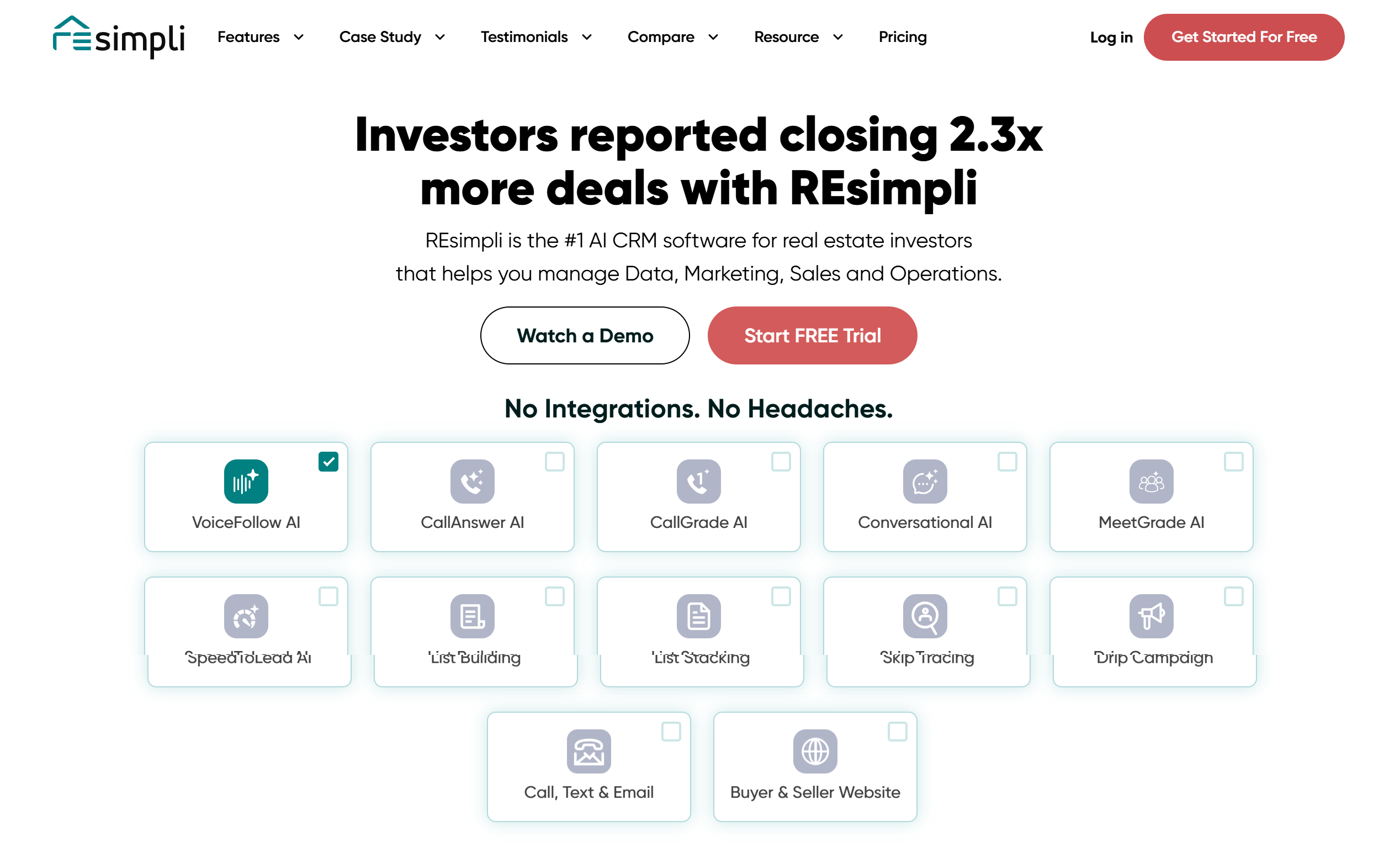
Best for: Real estate investors who want an all-in-one system to replace multiple tools
REsimpli is built specifically for real estate investors who want to manage leads, marketing, deals, and operations from one centralized platform. Instead of stitching together multiple tools, REsimpli combines CRM, marketing automation, list management, and investor workflows into a single, streamlined system.
Key Features:
- Lead and deal management built for investor pipelines
- Built-in list builder, list stacking, and free skip tracing
- Automated SMS, email, and follow-up campaigns
- Mobile app with Driving for Dollars and call handling
- 9 AI Agents for follow-ups
Why It Stands Out:
REsimpli eliminates the complexity of managing multiple real estate tools. Everything from lead generation to closing and follow-up lives in one place, making it easier for investors to scale without added operational overhead.
2. HubSpot CRM
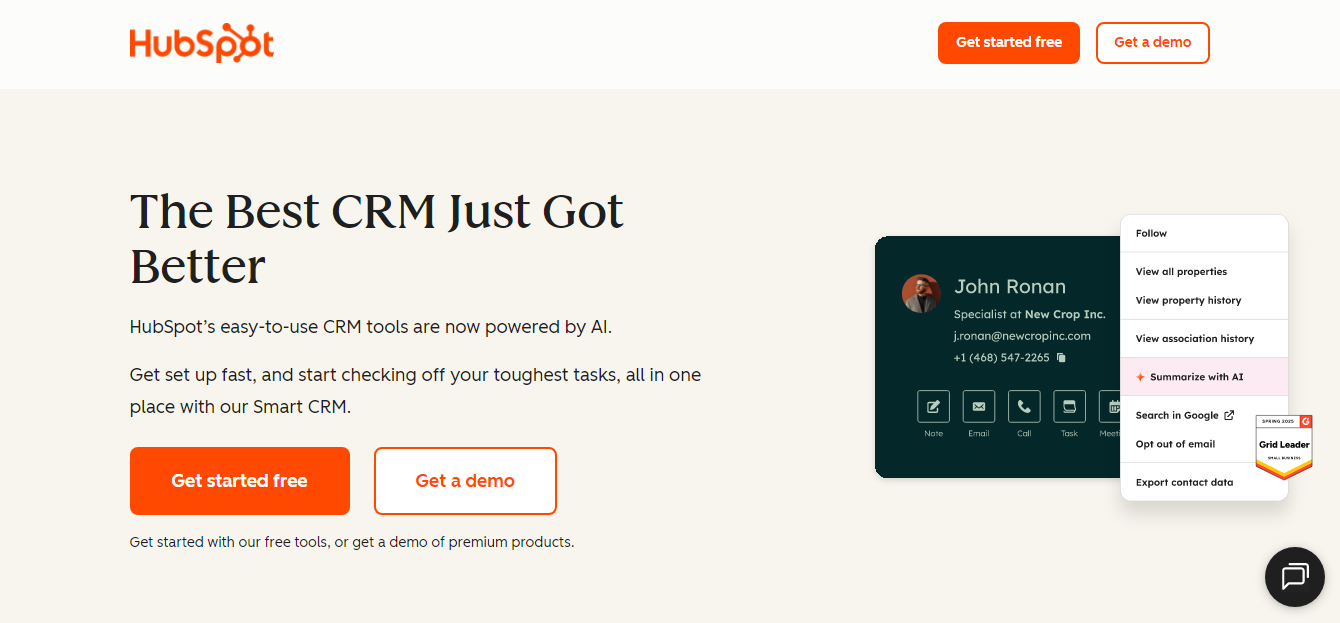
Best for: All-in-one client management and marketing automation
HubSpot CRM remains one of the most popular choices among real estate professionals thanks to its clean interface, marketing integrations, and free starter plan. It helps investors track leads, automate emails, and connect their CRM directly to their website or MLS data for real-time updates.
Key Features:
- Automated email and pipeline workflows
- Contact, lead, and deal tracking
- Built-in marketing suite for campaigns
- Mobile access and detailed performance reports
Why It Stands Out:
HubSpot scales effortlessly as your business grows. Whether you’re managing five listings or fifty, it keeps your client data and communications organized in one centralized system.
3. Salesforce CRM
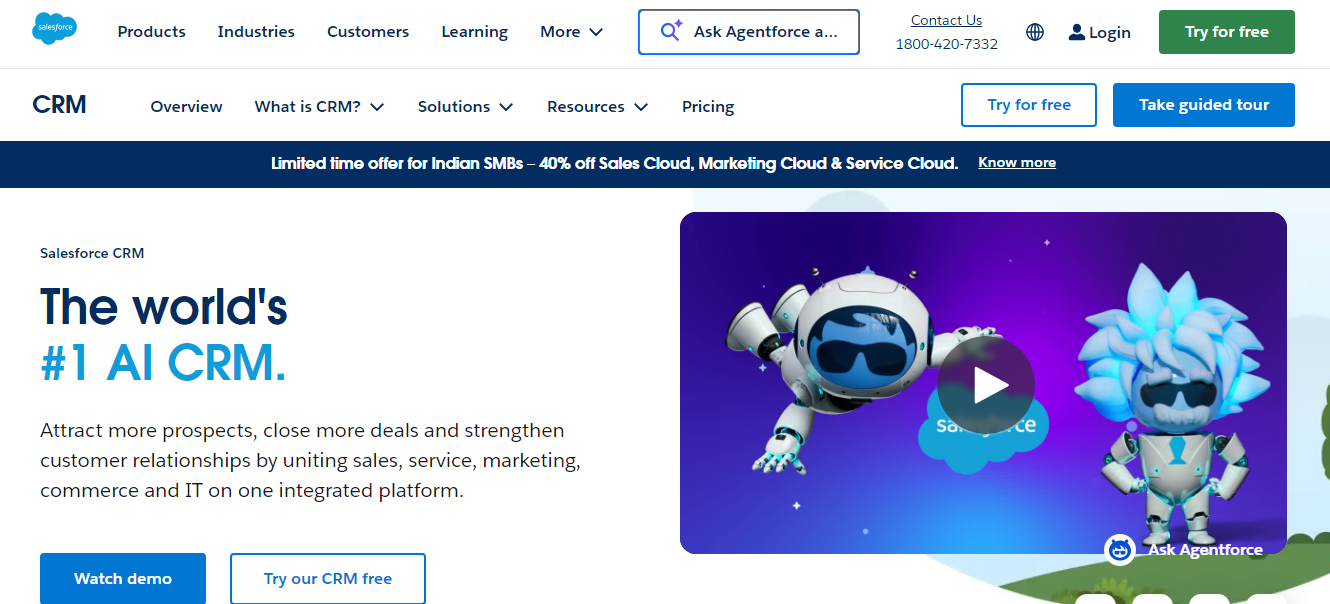
Best for: Large brokerages and teams with complex workflows
Salesforce has long been the go-to CRM for enterprises across industries, and real estate is no exception. With deep customization options and automation powered by Einstein AI, it’s built for teams that want full control over their sales and client data.
Key Features:
- AI-driven insights for smarter selling
- Advanced lead segmentation and scoring
- Custom dashboards and reporting tools
- Integration with hundreds of real estate and marketing apps
Why It Stands Out:
Salesforce offers unmatched flexibility and power — ideal for large real estate groups that want data-driven decision-making and advanced automation.
4. FAB CRM
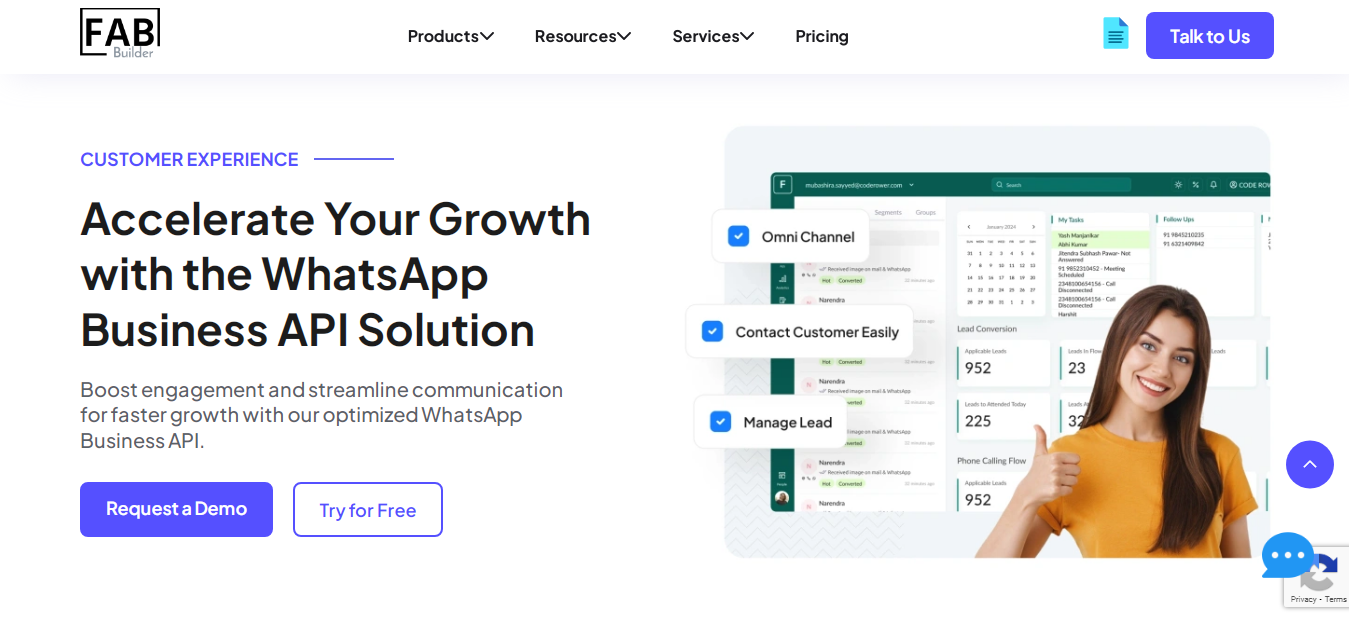
Best for: AI-driven automation and multi-channel engagement
FAB CRM is a next-generation real estate customer relationship management software that blends sales automation, client engagement, and advanced analytics. It’s built for investors and agencies that want a flexible, data-driven system that grows with their business.
Key Features:
- AI-powered workflows and chat automation
- WhatsApp, email, and SMS integration for real-time engagement
- Shared team inbox and automated follow-up sequences
- Comprehensive analytics and reporting dashboards
- Seamless integration with marketing and customer experience tools
Why It Stands Out:
FAB CRM stands apart for its focus on multi-channel client engagement and AI-powered insights. It doesn’t just help manage leads — it helps you understand client behavior, personalize communication, and close deals faster.
5. Wise Agent
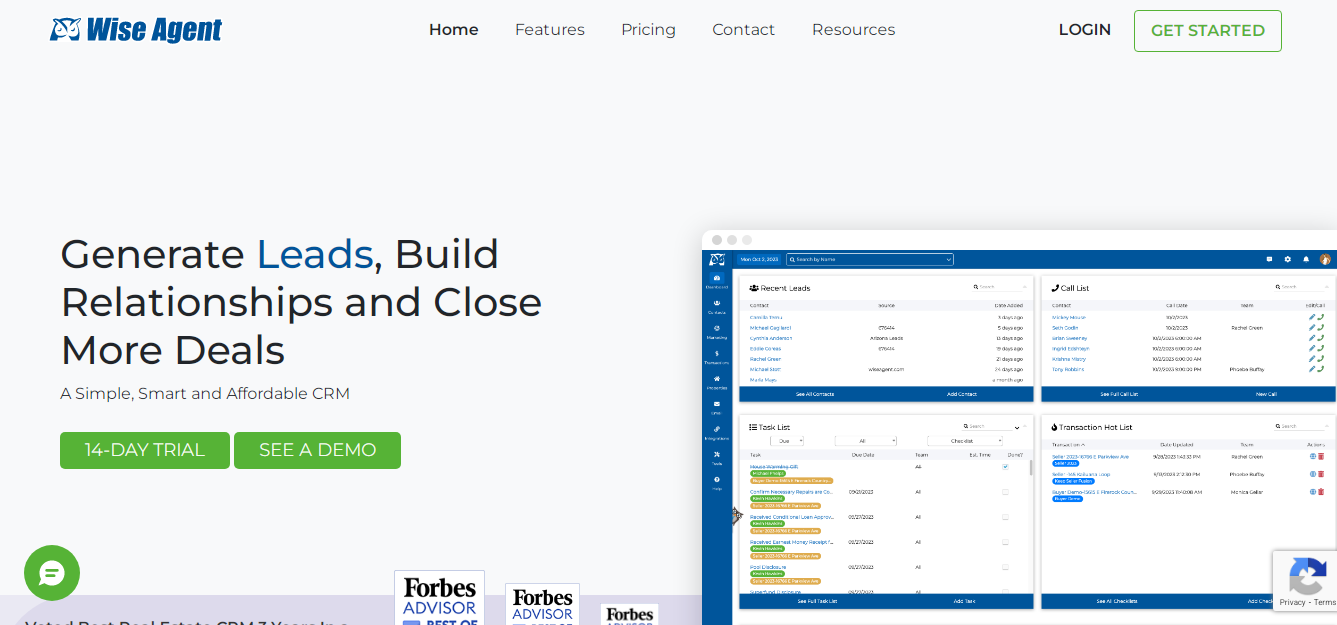
Best for: Real estate–specific workflows
Built specifically for real estate investors and brokers, Wise Agent focuses on helping professionals manage relationships, listings, and transactions from a single platform.
Key Features:
- Contact and property management
- Automated task reminders and follow-ups
- Email drip campaigns and marketing templates
- Team collaboration tools and reports
Why It Stands Out:
Wise Agent understands the day-to-day reality of real estate investors. It’s designed to support how you actually work — from open houses to client handovers.
6. Pipedrive
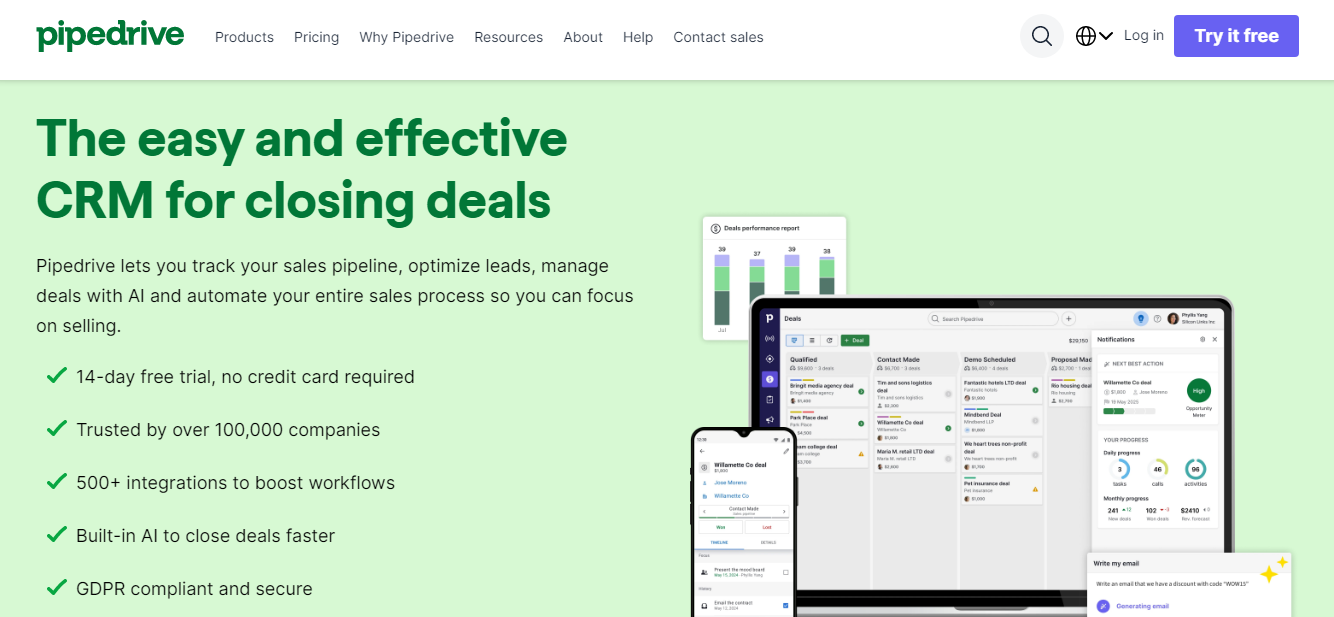
Best for: Visual deal tracking and simplicity
If you love clean visuals and a drag-and-drop interface, Pipedrive is built for you. Its easy-to-use layout makes tracking deals, scheduling follow-ups, and monitoring progress incredibly simple.
Key Features:
- Visual, customizable pipelines
- Calendar and email synchronization
- AI-powered sales assistance
- Customizable automation workflows
Why It Stands Out:
Pipedrive’s simplicity makes it perfect for investors managing multiple properties — offering visibility at a glance without unnecessary complexity.
7. Follow Up Boss
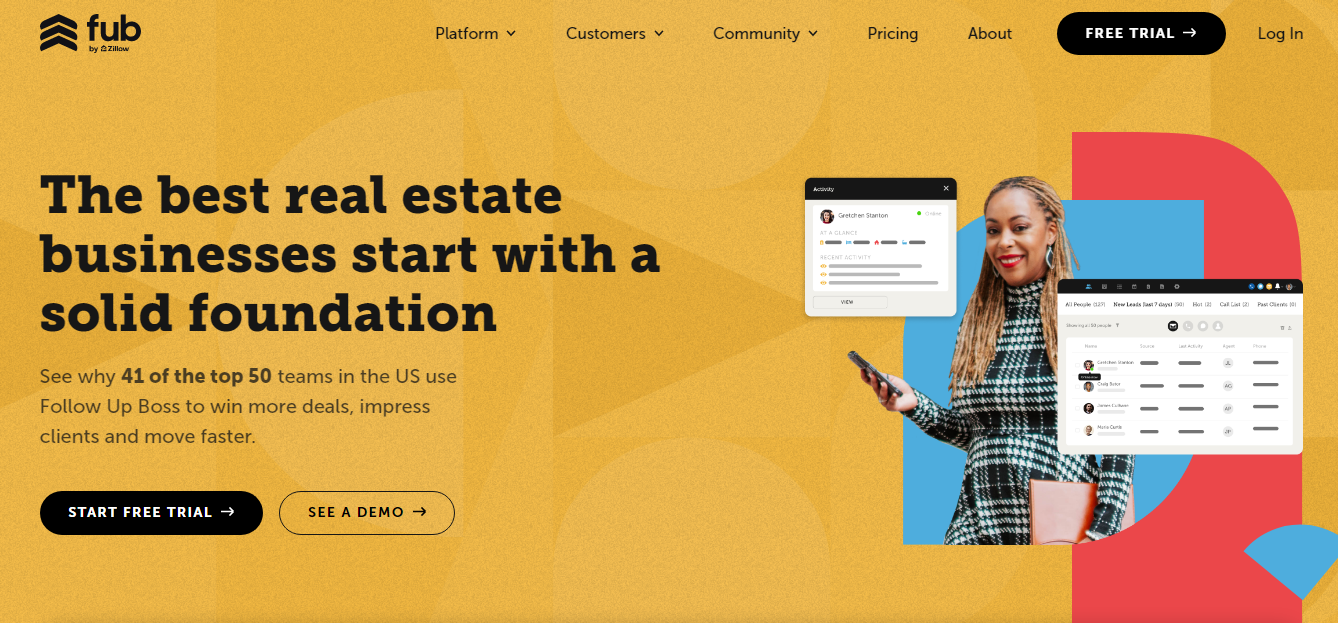
Best for: Instant lead response and team coordination
Follow Up Boss is built for speed. It automatically routes leads, sends instant follow-ups, and keeps your team connected to every opportunity — ensuring no inquiry is missed.
Key Features:
- Automated lead routing and notifications
- Text and email follow-up automation
- Team performance tracking
- Integrations with Zillow, Realtor.com, and Facebook Ads
Why It Stands Out:
In real estate, timing is everything. Follow Up Boss ensures your investors respond first — and win more deals because of it.
8. Real Geeks
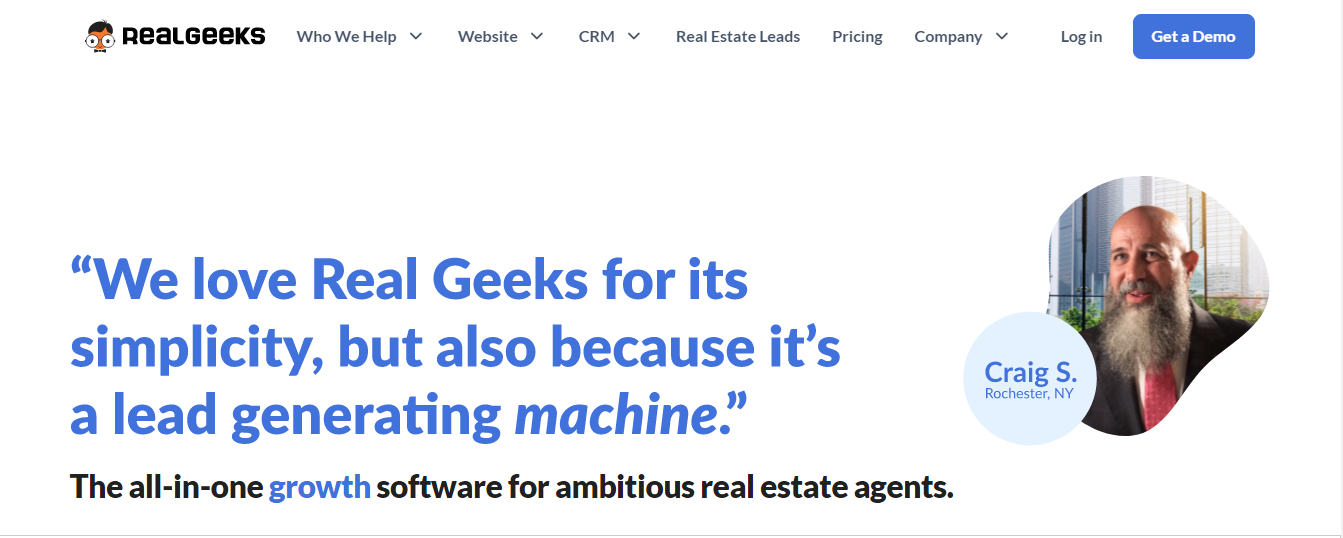
Best for: End-to-end marketing and lead generation
Real Geeks combines CRM, marketing automation, and IDX website integration into a single platform. It’s ideal for investors who want to attract, nurture, and convert leads without switching between multiple tools.
Key Features:
- IDX website and property search integration
- Lead capture forms and tracking
- Email and SMS marketing campaigns
- Analytics and reporting dashboards
Why It Stands Out:
Real Geeks provides an ecosystem where investors can manage the entire client journey — from online search to closing — in one connected environment.
9. Zoho CRM
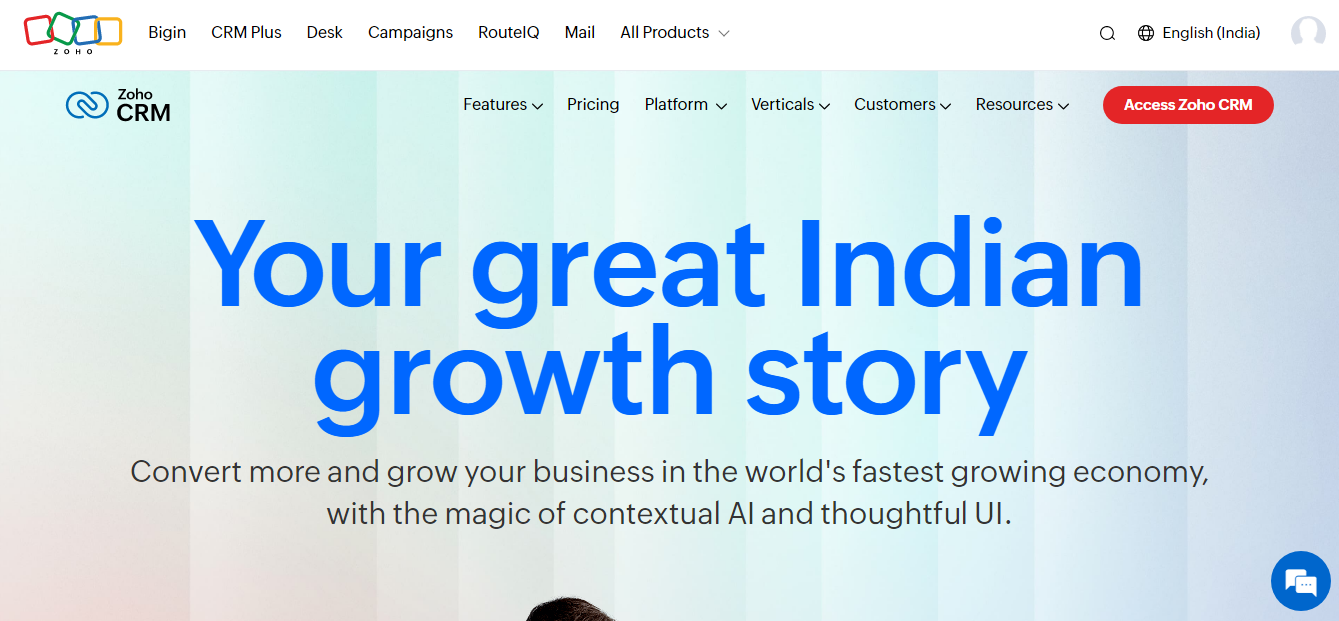
Best for: Budget-friendly real estate businesses
Zoho CRM offers an impressive range of automation and communication features at an affordable price. It integrates smoothly with email marketing tools, social media platforms, and analytics dashboards, making it a great all-in-one choice for small agencies.
Key Features:
- Lead scoring and tracking
- Workflow automation
- Pre-built email templates and campaigns
- Intuitive, mobile-friendly dashboard
Why It Stands Out:
Zoho delivers enterprise-grade features without the enterprise price tag — making it a top contender for startups or growing teams on a budget.
How to Choose the Right Real Estate CRM
Choosing the right CRM software for your real estate business is one of the most important decisions you’ll make. The right system can streamline your operations, improve client relationships, and drive more deals — while the wrong one can slow you down. Here’s how to make the right choice.
1. Define Your Business Needs
Start by identifying your pain points and goals. Are you struggling with lead management, inconsistent follow-ups, or disorganized client data? Outline your daily challenges and workflow before exploring options.
Tip: Choose a CRM that aligns with your team size, business model (individual agent, small team, or brokerage), and long-term growth plans.
2. Look for Real Estate–Specific Features
A generic CRM may lack features tailored for real estate. Look for one that includes:
- Automated lead capture from property listings, websites, and social media.
- Property and client matching tools.
- Built-in follow-up reminders and campaign automation.
- Centralized dashboards for listing and deal management.
These features ensure your CRM supports your specific sales cycle—from the first inquiry to closing.
3. Evaluate Integration and Scalability
Your CRM should work well with the tools you already use. Ensure it integrates with:
- Your website, email, and calendar systems.
- Property listing portals and marketing automation tools.
- Accounting and analytics platforms.
As your business grows, your CRM should easily scale without the need for costly upgrades or migrations.
4. Prioritize Usability and Adoption
Even the best CRM fails if your team doesn’t use it. Look for a system that’s simple, intuitive, and mobile-friendly. The interface should be easy to navigate so investors can spend more time selling and less time learning software.
Pro Tip: Opt for CRMs that provide onboarding support, tutorials, and responsive customer service to make adoption smooth.
5. Assess Cost and ROI
Don’t just compare prices—compare value. Look at what you’re getting in return:
- Time saved on manual tasks.
- Improved lead conversion rates.
- Better tracking of deals and revenue.
A good CRM will pay for itself through efficiency and growth. Always take advantage of free trials or demos before making a decision.
6. Analyze Reporting and Analytics
Data-driven insights are essential for success. Your CRM should give you access to:
- Sales pipeline visibility.
- Conversion tracking by source.
- Agent performance analytics.
- Forecasting tools for revenue and productivity.
These reports help you refine your strategies and make informed decisions.
7. Verify Support and Security
A reliable CRM provider offers consistent technical support, training resources, and secure data management. Make sure your system protects sensitive client data and allows easy backups and recovery.
How CodeRower Helps Real Estate Businesses Build Custom CRM Solutions
Every real estate business is unique — from the way it manages leads and listings to how it communicates with clients. Off-the-shelf CRM software often fails to capture these nuances. That’s where CodeRower steps in, helping real estate businesses build custom CRM systems tailored to their exact workflows, sales goals, and client engagement strategies.
1. Tailored to Your Business Workflow
CodeRower doesn’t believe in one-size-fits-all CRM systems. Its development team begins by analyzing your business operations — from lead generation to property sales — and then designs a CRM that perfectly fits your needs.
Whether you need modules for property management, agent performance tracking, or client communication, every element is built with your process in mind.
2. Seamless Lead Management and Automation
CodeRower builds CRMs that centralize all your leads in one place. You can track inquiries from websites, social media, or real estate portals, and automate follow-ups using intelligent workflows.
This automation ensures you never miss an opportunity while freeing your team to focus on closing deals instead of chasing leads manually.
3. Integrated Marketing and Analytics
A powerful CRM isn’t just about managing clients — it’s also about understanding them. CodeRower integrates advanced analytics dashboards and marketing tools into your CRM so you can track engagement, measure campaign ROI, and identify the most profitable lead sources.
With real-time insights, investors and managers can make smarter, data-driven decisions.
4. Mobile-First and Scalable Architecture
Real estate investors are always on the go. CodeRower’s CRMs are mobile-responsive and cloud-based, allowing your team to access client details, property data, and task lists from anywhere.
Plus, the systems are designed to scale — meaning as your business grows, your CRM grows with you without requiring an expensive overhaul.
5. Enhanced Collaboration Across Teams
Whether you have multiple investors, locations, or partner networks, CodeRower ensures smooth collaboration.
Custom permission controls, shared dashboards, and task assignment features allow everyone — from investors to managers — to stay connected and updated in real time.
6. Secure and Reliable Infrastructure
Data security is crucial in the real estate sector. CodeRower implements enterprise-grade encryption, access control, and cloud backups to ensure your client and property data remain secure and compliant at all times.
7. Continuous Support and Upgrades
Unlike pre-built CRMs that offer limited flexibility, CodeRower provides ongoing support, feature upgrades, and system optimizations. This ensures your CRM remains future-ready and evolves alongside your business and the real estate market.
Why Choose CodeRower for Your Real Estate CRM?
- Expertise in custom software development across diverse industries.
- Proven experience with real estate CRM and property tech platforms.
- Focus on user-friendly interfaces and AI-powered automation.
- Dedicated support team for seamless onboarding and scalability.
Conclusion
In today’s fast-paced property market, managing leads, clients, and listings manually is no longer sustainable. The right real estate CRM software can completely transform how your business operates — from streamlining workflows and automating communication to giving you real-time insights that drive smarter decisions.
Whether you’re a solo agent or managing a growing brokerage, investing in a CRM system designed for real estate helps you stay organized, close more deals, and build stronger relationships with your clients.
And if your business demands something more personalized, CodeRower offers custom CRM development services built specifically for the real estate industry. With tailored automation, intelligent analytics, and mobile-friendly solutions, CodeRower helps real estate teams simplify their processes and scale with confidence.
Don’t just manage your clients — connect, automate, and grow with a CRM solution built for success.
Ready to build your own real estate CRM?
Get in touch with CodeRower today to design a system that fits your business perfectly — from lead management to sales automation.
 +91 971 1141 179 ,
+91 971 1141 179 ,